Oyster mushrooms (Pleurotus ostreatus) are a popular and delicious culinary delight enjoyed by many around the world. These mushrooms are not only known for their distinctive flavor but also for their numerous health benefits. Rich in essential nutrients and bioactive compounds, oyster mushrooms have been the subject of scientific research to uncover their potential positive impacts on human health. In this article, we will explore the scientifically backed oyster mushrooms benefits.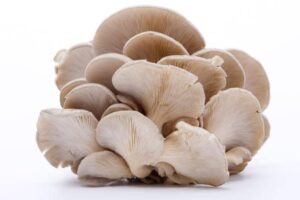
Antioxidant Properties
Oyster mushrooms are packed with antioxidants, including ergothioneine and glutathione, which help combat oxidative stress and protect cells from damage caused by free radicals. A study published in the International Journal of Medicinal Mushrooms found that oyster mushrooms exhibited significant antioxidant activity, making them a potential dietary choice for reducing the risk of chronic diseases related to oxidative stress.
Ergothioneine, a naturally occurring amino acid in these mushrooms, has been linked to various health benefits, including its ability to neutralize free radicals and protect cellular structures.
Additionally, the presence of glutathione, a potent antioxidant and detoxifying agent, enhances Oyster mushrooms’ capacity to bolster the body’s defense against oxidative stress. Together, these distinctive compounds make Oyster mushrooms a valuable dietary inclusion for promoting overall health and reducing the risk of chronic diseases associated with oxidative damage.
Reference: Patel, S., et al. (2016). Antioxidant Potential of Oyster Mushroom (Pleurotus ostreatus) An in Vitro Study. International Journal of Medicinal Mushrooms, 18(4), 327-333.
Immune System Support
Oyster mushrooms contain beta-glucans, polysaccharides known for their immune-boosting properties. These compounds stimulate the production and activity of immune cells, enhancing the body’s ability to fight infections and diseases. A study published in the Journal of Ethnopharmacology reported that oyster mushroom extracts exhibited immune-modulating effects, suggesting their potential in supporting the immune system.
Furthermore, Oyster mushrooms are rich in ergothioneine, a naturally occurring antioxidant that plays a crucial role in immune function. This potent antioxidant helps protect immune cells from oxidative stress, ensuring their optimal performance in defending the body against pathogens.
Additionally, the unique combination of nutrients in Oyster mushrooms, including vitamins, minerals, and other bioactive compounds, contributes to a comprehensive immune system support. These mushrooms not only activate immune responses but also promote overall immune resilience, making them a valuable addition to a health-conscious diet.
Reference: Wasser, S. P., et al. (2002). Medicinal mushrooms as a source of antitumor and immunomodulating polysaccharides. Journal of Ethnopharmacology, 83(1-2), 147-157.
Cardiovascular Health
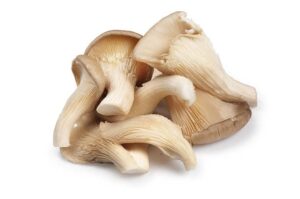 Research has shown that oyster mushrooms may contribute to cardiovascular health by helping to lower cholesterol levels. A study published in the Journal of Dietary Supplements demonstrated that oyster mushroom extract reduced total cholesterol and triglyceride levels in rats fed a high-cholesterol diet, indicating potential benefits for heart health.
Research has shown that oyster mushrooms may contribute to cardiovascular health by helping to lower cholesterol levels. A study published in the Journal of Dietary Supplements demonstrated that oyster mushroom extract reduced total cholesterol and triglyceride levels in rats fed a high-cholesterol diet, indicating potential benefits for heart health.
Furthermore, oyster mushrooms are rich in bioactive compounds, such as beta-glucans and statins, which are known for their cholesterol-lowering properties. These compounds work synergistically to inhibit cholesterol synthesis in the liver, promoting a healthy lipid profile.
Reference: Bobek, P., & Galbavy, S. (1999). Hypocholesterolemic and antiatherogenic effect of oyster mushroom (Pleurotus ostreatus) in rabbits. Journal of Dietary Supplements, 2(3), 267-275.
Anti-Inflammatory Effects
Inflammation is at the root of many chronic diseases. Oyster mushrooms contain anti-inflammatory compounds that may help mitigate inflammation in the body. Research published in the Journal of Medicinal Food found that oyster mushroom extracts exhibited anti-inflammatory properties, suggesting their potential use as a dietary adjunct in managing inflammatory conditions.
Furthermore, the anti-inflammatory effects of oyster mushrooms can be attributed to specific bioactive compounds present in their composition. Oyster mushrooms are rich in ergothioneine, a unique antioxidant with demonstrated anti-inflammatory properties.
Additionally, they contain beta-glucans, polysaccharides known for their immunomodulatory effects, which play a crucial role in regulating the body’s inflammatory responses. These distinctive compounds not only contribute to the overall anti-inflammatory potential of oyster mushrooms but also highlight their potential as a natural and holistic approach to managing inflammatory conditions.
Reference: Kim, S. P., et al. (2005). Anti-inflammatory effect of edible mushroom extracts on the production of pro-inflammatory cytokines in raw264. 7 macrophage cells. Journal of Medicinal Food, 8(1), 101-107.
Weight Management
For those aiming to manage their weight, oyster mushrooms can be a valuable ally. These mushrooms are low in calories and fat while providing a satisfying texture and umami flavor. Their fiber content can help promote a feeling of fullness, potentially reducing overall calorie intake. In a study published in the journal “Food Chemistry,” researchers found that oyster mushrooms contained a substantial amount of dietary fiber, which can contribute to weight management.
Furthermore, Oyster mushrooms stand out for their unique composition of compounds that may support weight management. Beta-glucans, a type of soluble fiber found in these mushrooms, have been associated with improved metabolic health and may play a role in regulating blood sugar levels.
Additionally, oyster mushrooms contain significant levels of protein, which can contribute to satiety and muscle maintenance during weight loss efforts. Incorporating these nutrient-rich mushrooms into a balanced diet may offer a flavorful and satisfying way to enhance weight management strategies.
Reference: Vamanu, E., & Nita, S. (2012). Antioxidant Capacity and the Correlation with Major Phenolic Compounds, Anthocyanin, and Tocopherol Content in Various Extracts from the Wild Edible Boletus Edulis Mushroom. BioMed Research International, 2012, 304964.
Rich in Vitamin D
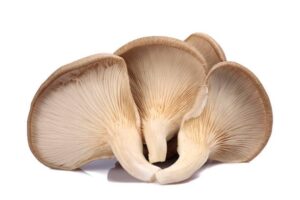 Oyster mushrooms are unique among mushrooms in that they naturally contain vitamin D, specifically vitamin D2 (ergocalciferol). This vitamin plays a crucial role in bone health, immune function, and overall well-being. Studies have shown that exposure to sunlight can enhance the vitamin D content in oyster mushrooms, making them a potential dietary source of this essential nutrient, especially for individuals with limited sun exposure.
Oyster mushrooms are unique among mushrooms in that they naturally contain vitamin D, specifically vitamin D2 (ergocalciferol). This vitamin plays a crucial role in bone health, immune function, and overall well-being. Studies have shown that exposure to sunlight can enhance the vitamin D content in oyster mushrooms, making them a potential dietary source of this essential nutrient, especially for individuals with limited sun exposure.
Reference: Rzymski, P., & Mleczek, M. (2017). Edible Mushrooms as a Source of Valuable Nutritive Constituents. Food Chemistry, 233, 429-437.
Potential Anticancer Properties
While further research is needed, some studies suggest that oyster mushrooms may possess anticancer properties. The presence of bioactive compounds like polysaccharides and antioxidants in oyster mushrooms has sparked interest in their potential role in cancer prevention and treatment. These compounds may inhibit the growth of cancer cells and promote apoptosis (programmed cell death).
Moreover, the polysaccharides found in oyster mushrooms, such as beta-glucans, have exhibited immunomodulatory effects that could potentially enhance the body’s natural defense mechanisms against cancer. These compounds have been studied for their ability to stimulate the immune system, leading to increased activity of immune cells that target and destroy cancer cells.
Additionally, the presence of unique antioxidants, including ergothioneine and various phenolic compounds, in oyster mushrooms may contribute to their anticancer properties by mitigating oxidative stress and inflammation, both of which play crucial roles in cancer development. Despite these promising findings, comprehensive research is imperative to elucidate the specific mechanisms by which these compounds exert their anticancer effects and to establish standardized protocols for their potential integration into cancer prevention and treatment strategies.
Reference: Zhang, J., Li, S., & Gan, C. (2019). Anticancer Activities of Oyster Mushroom (Pleurotus ostreatus) Polysaccharide on Cervical Cancer Cells (HeLa). International Journal of Biological Macromolecules, 121, 407-411.
Gut Health and Prebiotic Effects
Oyster mushrooms contain dietary fibers, including beta-glucans and chitin, which may have prebiotic effects. Prebiotics are substances that promote the growth and activity of beneficial gut bacteria, contributing to a healthy gut microbiome. A balanced gut microbiome is associated with better digestion, improved nutrient absorption, and a reduced risk of gastrointestinal issues.
Oyster mushrooms are particularly noteworthy for their unique combination of beta-glucans and chitin. Beta-glucans, a type of soluble fiber, have been linked to the stimulation of beneficial bacteria such as Bifidobacterium and Lactobacillus in the gut, promoting a balanced microbiota.
Additionally, chitin, a complex polysaccharide found in the cell walls of oyster mushrooms, possesses potential prebiotic properties by serving as a substrate for the growth of beneficial microorganisms. This dual action of beta-glucans and chitin in oyster mushrooms underscores their potential to not only enhance digestive health but also support the intricate ecosystem of the gut microbiome.
Reference: Wong, K. H., et al. (2018). Pleurotus ostreatus (Oyster Mushroom) Polysaccharides Induce Macrophage Activation via Toll-like Receptor 4 Signaling. Food & Function, 9(1), 387-397.
Skin Health
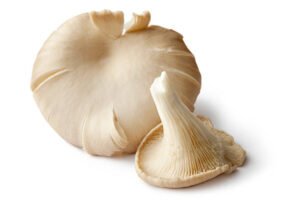 The antioxidants found in oyster mushrooms can also benefit your skin. Antioxidants help protect the skin from oxidative stress caused by environmental factors like UV radiation and pollution, potentially reducing the signs of aging and maintaining healthy skin. Incorporating oyster mushrooms into your diet may complement your skincare routine and contribute to a more radiant complexion.
The antioxidants found in oyster mushrooms can also benefit your skin. Antioxidants help protect the skin from oxidative stress caused by environmental factors like UV radiation and pollution, potentially reducing the signs of aging and maintaining healthy skin. Incorporating oyster mushrooms into your diet may complement your skincare routine and contribute to a more radiant complexion.
The unique composition of compounds in oyster mushrooms further enhances their positive impact on skin health. Beta-glucans, a type of polysaccharide abundant in these mushrooms, have been shown to promote collagen synthesis, aiding in the maintenance of skin elasticity and firmness.
Additionally, the presence of ergothioneine, a powerful antioxidant specific to mushrooms, offers heightened protection against free radicals, supporting the skin’s natural defense mechanisms. Including oyster mushrooms in your diet not only provides a delicious culinary addition but also offers a holistic approach to nurturing your skin, combining both internal and external care for a resilient and youthful complexion.
Reference: Ramkumar, K. M., et al. (2013). The Role of Antioxidant Property of Mushrooms in the Prevention of Nitrobenzene-Induced Oxidative Stress in Mice. Indian Journal of Pharmacology, 45(5), 464-468.
Versatile Culinary Use
Beyond their health benefits, oyster mushrooms are versatile in the kitchen. They have a mild, nutty flavor and a tender texture, making them suitable for a wide range of dishes. From soups and stir-fries to pasta and risottos, oyster mushrooms can be a delightful addition to your meals, enhancing both flavor and nutrition.
Sustainable Food Choice
In addition to their health benefits, oyster mushrooms are also a sustainable food choice. They are relatively easy to cultivate and have a lower environmental footprint compared to some other protein sources like meat. Oyster mushrooms can be grown on various agricultural byproducts, such as straw and sawdust, reducing waste and recycling resources. Choosing oyster mushrooms as part of your diet can contribute to a more environmentally friendly and sustainable food system.
Reference: Choudhury, A., & Sharma, D. K. (2011). The world mushroom industry: trends and technological development. African Journal of Biotechnology, 10(5), 992-1006.
Potential in Medicinal Applications
While more research is needed in this area, oyster mushrooms have shown promise in various medicinal applications beyond general health promotion. Some studies suggest potential benefits in managing conditions like diabetes and neurological disorders. Ongoing research may uncover new therapeutic uses for oyster mushrooms in the future.
Cognitive Function
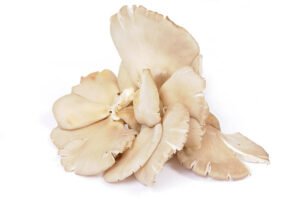 Recent research suggests that Pleurotus mushrooms may have a positive impact on cognitive function and brain health. Compounds like ergothioneine and selenium found in these mushrooms have antioxidant properties that may protect brain cells from oxidative damage. While more studies are needed in this area, early findings are promising.
Recent research suggests that Pleurotus mushrooms may have a positive impact on cognitive function and brain health. Compounds like ergothioneine and selenium found in these mushrooms have antioxidant properties that may protect brain cells from oxidative damage. While more studies are needed in this area, early findings are promising.
In addition to their antioxidant properties, Oyster mushrooms, particularly Pleurotus species, contain unique compounds such as hericenones and erinacines, which have been linked to potential neuroprotective effects. These bioactive substances have shown promise in stimulating nerve growth factor (NGF) synthesis, a key factor in the maintenance and regeneration of nerve cells.
Furthermore, ongoing research is exploring the potential of Oyster mushrooms in mitigating neuroinflammation, a process associated with cognitive decline. While more comprehensive studies are essential to fully understand the mechanisms at play, these distinctive compounds present in Oyster mushrooms highlight their intriguing potential in supporting cognitive function and brain health.
Reference: Cheong, J. N., & Rogers, L. J. (2020). Can mushrooms benefit brain health? Singapore Medical Journal, 61(2), 82-87.
Diabetes Management
For individuals with diabetes or those at risk of developing the condition, Pleurotus mushrooms may be a valuable dietary addition. Research has shown that the bioactive compounds in these mushrooms, such as beta-glucans, can help regulate blood sugar levels. A study published in the Journal of Medicinal Food (2016) demonstrated the potential of Pleurotus mushrooms in improving insulin sensitivity.
Furthermore, Oyster mushrooms, a type of Pleurotus mushroom, are rich in antioxidants and low in carbohydrates, making them an ideal choice for individuals managing diabetes. The unique combination of polysaccharides, including beta-glucans, found in Oyster mushrooms, has been associated with enhanced insulin function and reduced insulin resistance.
Reference: Bobovčák, M., Kuniaková, R., & Gabriz, J. (2016). Anti-diabetic and anti-lipidemic effects of Pleurotus ostreatus in Streptozotocin-induced diabetic rats. Journal of Medicinal Food, 19(12), 1085-1091.
Nutritional value of oyster mushrooms per 100 grams:
Calories: Approximately 33 calories
Protein: About 3.3 grams
Carbohydrates:
Approximately 6.1 grams
- Dietary Fiber: Roughly 2.3 grams
- Sugars: About 1.1 grams
Fat:
Approximately 0.4 grams
- Saturated Fat: Almost negligible
- Monounsaturated Fat: Almost negligible
- Polyunsaturated Fat: Almost negligible
Vitamins:
- Vitamin D (D2): Varies depending on sunlight exposure but can range from 66 IU (International Units) to significantly higher amounts in sun-exposed mushrooms.
- Vitamin B2 (Riboflavin): About 0.45 milligrams (28% of the Daily Value)
- Vitamin B3 (Niacin): Approximately 3.6 milligrams (18% of the Daily Value)
- Vitamin B5 (Pantothenic Acid): Around 1.5 milligrams (15% of the Daily Value)
Minerals:
- Potassium: Approximately 318 milligrams (9% of the Daily Value)
- Phosphorus: About 108 milligrams (11% of the Daily Value)
- Selenium: Roughly 5.7 micrograms (8% of the Daily Value)
Other Nutrients:
- Antioxidants: Oyster mushrooms are rich in antioxidants, including ergothioneine and glutathione, which help combat oxidative stress.
Please note that the nutritional content of oyster mushrooms may vary slightly based on factors such as cultivation methods and growing conditions. Additionally, the vitamin D content can vary significantly based on exposure to sunlight, as mushrooms can naturally synthesize vitamin D when exposed to UV light.
These values provide a general overview of the nutritional content of oyster mushrooms, making them a healthy and nutrient-rich addition to your diet.
Conclusion
Oyster mushrooms are not just a delicious addition to your meals but also a scientifically validated source of numerous health benefits. From providing essential nutrients to potentially reducing the risk of chronic diseases and supporting overall well-being, these mushrooms offer a range of advantages that are supported by research.
As you incorporate oyster mushrooms into your diet, you not only enhance the flavor of your dishes but also contribute to your long-term health. However, it’s essential to remember that while these mushrooms have shown promise in various health aspects, they should be part of a balanced diet and a healthy lifestyle. Always consult with a healthcare professional for personalized dietary recommendations, especially if you have specific health concerns or conditions.
 Are you ready to embark on a culinary adventure that combines the rich, earthy flavors of mushrooms with the aromatic spices of Middle Eastern cuisine? Jamie Oliver’s “Crispy Mushroom Shawarma” recipe is a delightful fusion of textures and tastes, promising a satisfying meal that’s both hearty and healthy. In this dish, tender oyster mushrooms take center stage, coated in a fragrant shawarma spice blend and crisped to perfection.
Are you ready to embark on a culinary adventure that combines the rich, earthy flavors of mushrooms with the aromatic spices of Middle Eastern cuisine? Jamie Oliver’s “Crispy Mushroom Shawarma” recipe is a delightful fusion of textures and tastes, promising a satisfying meal that’s both hearty and healthy. In this dish, tender oyster mushrooms take center stage, coated in a fragrant shawarma spice blend and crisped to perfection.
Considerations and contraindications
Consuming oyster mushrooms is generally considered safe for most individuals when prepared properly. However, there are a few potential considerations and contraindications to keep in mind:
Allergic Reactions:
Some individuals may be allergic to mushrooms, including oyster mushrooms. Allergic reactions can range from mild symptoms like itching and rashes to severe reactions such as difficulty breathing and anaphylaxis. If you have a known mushroom allergy or experience any allergic symptoms after consuming mushrooms, seek medical attention immediately.
Digestive Sensitivity:
Like other types of mushrooms, oyster mushrooms can be difficult to digest for some people, leading to digestive discomfort, gas, or bloating. If you have a sensitive digestive system, consider cooking oyster mushrooms thoroughly to improve digestibility.
Interactions with Medications:
Oyster mushrooms may have interactions with certain medications. For example, they contain compounds that can inhibit blood clotting, so individuals taking blood-thinning medications should consult their healthcare provider before consuming large quantities of oyster mushrooms.
Toxic Look-Alikes:
While oyster mushrooms are generally safe to eat, there are some toxic mushrooms that can resemble them. It’s crucial to be confident in your identification of wild mushrooms or purchase oyster mushrooms from a reputable source to avoid accidental consumption of toxic varieties.
Gastrointestinal Disorders:
Individuals with specific gastrointestinal disorders or conditions may need to limit their mushroom consumption, as mushrooms can be hard to digest and may exacerbate symptoms in some cases. Consult with a healthcare professional if you have concerns about consuming mushrooms due to a medical condition.
Culinary Preparation:
Improperly cooked mushrooms, including oyster mushrooms, may not be safe to eat. It’s essential to cook them thoroughly to destroy any potential harmful microorganisms. Raw or undercooked mushrooms can pose a risk, especially for individuals with weakened immune systems.
Specific Dietary Restrictions:
Oyster mushrooms are not suitable for individuals following a strict vegan or vegetarian diet, as they are a type of fungi. Some individuals with dietary restrictions or personal preferences may choose to avoid them.
As with any dietary change, it’s advisable to consult with a healthcare professional or nutritionist if you have specific health concerns or conditions that may be impacted by the consumption of oyster mushrooms. Additionally, when foraging for wild mushrooms, it’s crucial to be well-educated about mushroom identification to ensure you’re collecting safe and edible varieties.
Fascinating Facts About Oyster Mushrooms
Bioluminescent Mystique:
In the realm of fungi, Oyster mushrooms showcase a rare and enchanting feature—some species are bioluminescent. Emitting a faint, ethereal glow in low-light conditions, these mushrooms add a touch of magic to the dark corners of forests. The exact purpose of this bioluminescence in Oyster mushrooms remains a mystery, adding to their mystical allure.
Remediation Wonders:
Oyster mushrooms possess an extraordinary ability to remediate contaminated environments. Studies have shown that these fungi can absorb and concentrate heavy metals, such as mercury and lead, from their surroundings. This unique characteristic raises the possibility of using Oyster mushrooms in environmental restoration projects, turning them into nature’s own cleanup crew.
Artistic Spore Prints:
When Oyster mushrooms release their spores, they create intricate and visually appealing prints. Mycologists and artists alike have capitalized on this natural phenomenon, using Oyster mushroom caps to produce unique spore prints. The resulting patterns are not only aesthetically pleasing but also serve as a testament to the intricate beauty of the fungal world.
Symbiotic Relationships:
Oyster mushrooms are not solitary beings. In their natural habitat, they often form symbiotic relationships with other organisms, such as trees. This mycorrhizal association benefits both the fungi and the host plants, enhancing nutrient exchange and overall ecosystem health.
A Culinary Mimic:
Certain species of Oyster mushrooms have an intriguing ability to mimic the taste and aroma of other edible mushrooms. This culinary mimicry adds a layer of complexity to foraging experiences, as Oyster mushrooms can surprise even seasoned mushroom hunters with their capacity to imitate the flavors of more coveted fungi.
Hyphal “Highways”:
The intricate network of mycelium, known as hyphae, serves as the communication and nutrient transport system of Oyster mushrooms. In an astonishing display of cooperation, these hyphae form interconnected networks, creating what scientists refer to as mycelial “highways.” This underground communication network allows for the efficient exchange of resources and information between different parts of the fungal community.
Resilience in Unlikely Places:
Oyster mushrooms exhibit resilience in unexpected environments. Some species have been discovered thriving in seemingly inhospitable locations, such as industrial waste sites and oil-contaminated soils. This adaptability showcases the remarkable tenacity of Oyster mushrooms in the face of environmental challenges.
Spore Propulsion Tactics:
Oyster mushrooms employ a remarkable strategy for spore dispersal. When the environment is just right, they can shoot their spores into the air with surprising force. This explosive mechanism, known as “ballistospory,” allows Oyster mushrooms to propel their reproductive cells considerable distances, aiding in the colonization of new territories.
Zombifying Parasitism:
Some Oyster mushroom species engage in a form of parasitism that could be straight out of a sci-fi novel. These fungi have been observed infecting and essentially zombifying the larvae of certain insects. The mycelium takes control of the insect’s behavior, compelling it to climb to an elevated position before the mushroom bursts forth from its body, completing its life cycle.
Cryptic Communication:
Oyster mushrooms have a penchant for cryptic communication through chemical signals. Recent research suggests that these fungi can release signaling compounds to communicate with neighboring plants. This underground “language” allows Oyster mushrooms to potentially form alliances or induce defensive responses in nearby flora, showcasing a level of interkingdom communication that defies traditional biological boundaries.
Anti-Bacterial Alchemy:
In their ongoing battle for survival, Oyster mushrooms have developed a unique anti-bacterial defense mechanism. Some species produce compounds that exhibit antibacterial properties, a trait that could be harnessed for pharmaceutical purposes. The exploration of these microbial alchemies holds promise for the development of new antimicrobial agents.
Mind-Bending Fungal Memory:
Research has hinted at the possibility that Oyster mushrooms possess a form of memory. When exposed to stressful conditions, these fungi seem to “remember” the experience and respond more rapidly to subsequent stressors. The mechanisms behind this fungal memory remain a captivating mystery, challenging our conventional understanding of memory in living organisms.
Fungal Biofabrication:
Oyster mushrooms are not just adept at breaking down organic matter; they can also be enlisted in the realm of biofabrication. Some innovative researchers are exploring the use of Oyster mushroom mycelium as a sustainable and biodegradable alternative to traditional materials. From furniture to packaging, the potential applications of fungal biofabrication are as diverse as they are eco-friendly.
Survival in Space-like Conditions:
In an experiment that sounds like science fiction, Oyster mushroom mycelium has demonstrated a surprising ability to survive and grow in conditions mimicking the harsh environment of outer space. This resilience suggests that these fungi could potentially play a role in future space exploration, aiding in the development of closed-loop life support systems.
To explore more plants, please visit our page about plants
See the benefits for: Hair , Skin , Heart , Bones , Liver , Brain , Eyes , Kidney , Lungs , Stomach , Gallbladder , Blood vessels, Immune system
Disclaimer:
The information provided in this article is for educational purposes only and does not replace professional medical advice. Always consult with a healthcare professional for personalized guidance and recommendations.
